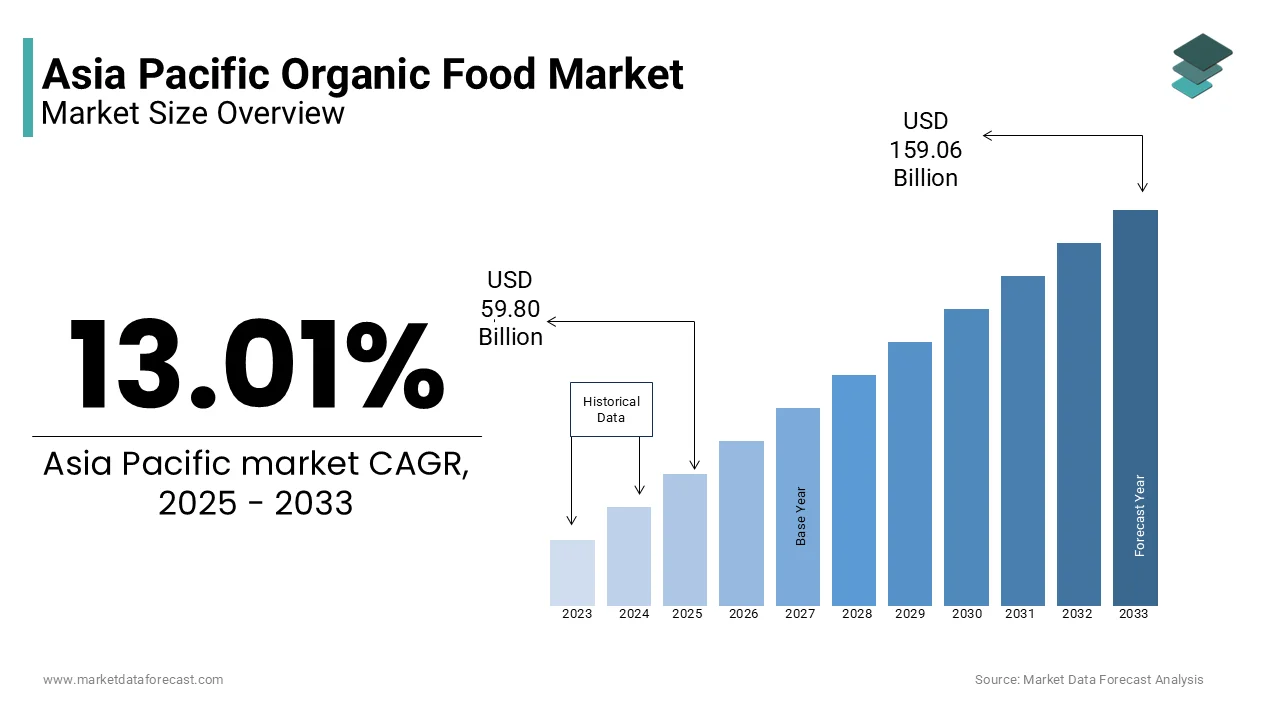Asia-Pacific Organic Food Market Research Report - Segmented By Product Type, And By Region (China, India, Japan, South America, Australia, New Zealand, and Southeast Asia) - Industry Analysis, Size, Share, Growth, Trends, and Competitive Analysis Forecasts Report 2025 to 2033
Asia Pacific Organic Food Market Size
Asia Pacific Organic Food Market size was valued at USD 52.90 billion in 2024, and the market size is expected to reach USD 159.06 billion in 2033 from USD 59.80 billion in 2025. The market's promising CAGR for the predicted period is 13.01%.

MARKET OVERVIEW
Food produced without the use of pesticides and fertilizers is called organic food, and this type of farming is called organic farming. Organic farming techniques may vary worldwide, but they promote ecological balance and conserve biodiversity. Generally, organic foods contain large levels of antioxidants and certain micronutrients such as zinc, iron, and vitamin C. Foods covered under current organic standards are fruits and vegetables, including mushrooms, grains, legumes, nuts and seeds, dairy products and eggs, livestock feed, meats, and poultry. Organic food is processed by certain standards of organic farming. These standards prohibit the use of most synthetic fertilizers and pesticides, sewer sludge fertilizers, genetic engineering, growth hormones, irradiation, antibiotics, artificial ingredients, and many synthetic additives. Organic livestock is raised for dairy products, eggs, and meat. The animals have access to the outdoors and are given organic feed. They are not fed with growth hormones, antibiotics, or any animal by-products.
Rising concerns about the environment and health benefits associated with organic foods are mainly driving the Asia-Pacific organic food market. In addition, increasing average household annual spending on food, increase in chronic diseases, greater accessibility of these products through small to medium-scale retailers, changing lifestyles, implementation of initiatives to encourage farmers to switch to organic farming, rising working women population base, rise in several organic food manufacturers are also complying with international standards and are labelling their products are also driving the market. However, the lack of a skilled number of professionals and high-cost equipment for farming re hindering the growth of the market.
REPORT COVERAGE
|
REPORT METRIC |
DETAILS |
|
Market Size Available |
2024 to 2033 |
|
Base Year |
2024 |
|
Forecast Period |
2025 to 2033 |
|
CAGR |
13.01% |
|
Segments Covered |
By Product Type and Region |
|
Various Analyses Covered |
Global, Regional, & Country Level Analysis; Segment-Level Analysis; DROC; PESTLE Analysis; Porter’s Five Forces Analysis; Competitive Landscape; Analyst Overview of Investment Opportunities |
|
Regions Covered |
India, China, Japan, South Korea, Australia, New Zealand, Thailand, Malaysia, Vietnam, Philippines, Indonesia, Singapore, and the Rest of Asia-Pacific |
|
Market Leaders Profiled |
White Wave Foods, Spartan Stores Inc, Hain Celestial, United Natural Foods Inc, General Mills, AMCON Distributing Co, Sprouts Farmers Market, Amy’s Kitchen, Cliff Bar & Company, Whole Foods Market Inc, Dean Foods, Organic Valley, and others. |
MARKET SEGMENTATION
This Research Report on Asia Pacific Organic Food Market is segmented and susub-segmentednto into the following categories.s
By Product Type
- Fruits and Vegetables
- Grains
- Meats
- Poultry
- Dairy Products
- Livestock Feed
- Others
Fruits and Vegetables have the largest market, while meats and poultry are the fastest-growing segments.
By Country
- China
- India
- Japan
- South Korea
- Australia
KEY MARKET PLAYERS
Key Players in the Asia Pacific organic food market are White Wave Foods, Spartan Stores Inc, Hain Celestial, United Natural Foods Inc, General Mills, AMCON Distributing Co, Sprouts Farmers Market, Amy’s Kitchen, Cliff Bar & Company, Whole Foods Market Inc, Dean Foods, Organic Valley.
Frequently Asked Questions
1.What are the key factors driving the demand for organic food in the Asia-Pacific region?
Understanding the drivers behind the demand helps stakeholders identify market opportunities and develop effective marketing strategies. Factors may include health consciousness, environmental concerns, food safety issues, and lifestyle choices.
2.What are the different categories of organic food products commonly consumed in the Asia-Pacific region?
Organic food encompasses various categories, including fruits and vegetables, grains and cereals, dairy products, meat and poultry, beverages, snacks, and processed foods. Knowing the preferences of consumers and trends in consumption helps businesses tailor their product offerings.
3.What are the challenges faced by companies operating in the Asia-Pacific organic food market?
Challenges could range from sourcing organic raw materials, maintaining organic integrity along the supply chain, price competitiveness, and regulatory compliance. Identifying and addressing these challenges is crucial for sustainable growth.
Related Reports
Access the study in MULTIPLE FORMATS
Purchase options starting from $ 2000
Didn’t find what you’re looking for?
TALK TO OUR ANALYST TEAM
Need something within your budget?
NO WORRIES! WE GOT YOU COVERED!
Call us on: +1 888 702 9696 (U.S Toll Free)
Write to us: [email protected]